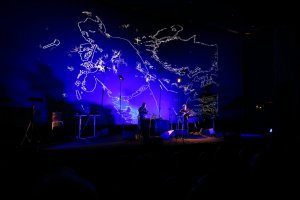Liest man die Rezensionen zum letzten Scott Walker-Album, fällt auf, dass es gewisse Reaktionstypen gibt: zum einen geben die besten Besprechungen dem Hörer Möglichkeiten an die Hand, den rätselhaften Song-, Sound- und Textgebilden nah zu kommen, ja, sich gar auf sie einzulassen, und alle nicht restlos geklärten Wenns und Abers mal ruhen zu lassen. Hervorragend etwa die lange Coverstory von Mike Barnes im WIRE, der manches Element dieser vermeintlch hermetischen Lyrik entschlüsselt. Auch die Rezensionen in Tiny Mix Tapes, bei Consequence of Sound und im Guardian sind angenehm erhellend.
Demgegenüber produzieren etliche andere Rezensenten typische Verhaltensmuster bei der Begegnung mit dem Total-Befremdlichen. Gut zu beobachten ist diese pseudo-intelligente Art von Abwehrreaktion in Trash-Movies aus den Fünfziger Jahren, wenn nichtsahnende Menschen plötzlich Riesenspinnen und Aliens begegnen: wer dem „common sense“ abschwört, wird leicht als „Feind“ klassifiziert, als „krank“, oder „Autist“. Kein Wunder also, dass man Scott Walkers Kunst in dieser Lesart als „dummen Umfug“ abkanzelt, als „pathologischen Stoff“, den allenfalls David Bowie verstehen könnte (warum ausgerechnet der?), ja, es wird gar bestritten, dass es sich hier überhaupt um Musik handle. Bish Bosch kann wahlweise Fluchtreflexe (bei James Blunt-Fans, z.B.) spontane Indifferenz, oder interessierte Annäherung in Gang setzen (bei Faszinierten).
Die Welt von Bish Bosch ist nicht verstörender und unzugänglcher als diverse radikale Meisterwerke der Filmgeschichte wie Wenn die Gondeln Trauer tragen, Cache, Mulholland Drive, Stalker oder späte Filme von Bresson. Wenn die Grenzen des Mainstreams einfach mal grundlegend aus den Angeln gehoben werden, kommt gerne auf Kritikerseite der sog. gesunde Menschenverstand zu Wort. Zum Gähnen: schon Oscar Wilde wusste, dass der gute Geschmack mitunter der Feind der Kunst ist. Aber noch mal ganz klar, damit ich nicht für einen Avantgarde-Fuzzi gehalten werde: es gibt Musik, die noch so grandios sein kann, die einen einfach ungerührt lässt. Jeder findet die Musik, die ihm oder ihr die beste Seelennahrung liefert. Nur gilt es, Polemik durchaus kiloweise auszuschütten, wo jemand aus völliger Borniertheit heraus etwas niedermacht, was er überhaupt nicht versteht. Und dann noch den Künstler persönlich angreift: selbstgefällige Krämerseelen.
Da wäre dann Schweigen besser. Und klüger. Ich würde mir nie erlauben, eine Polemik zu Olivier Messiaen zu verfassen, nur, weil mich die Musik schlichtweg nicht berührt. Wenn im Oktober ein neues Album von und mit Scott Walker erscheint (eine Kollaboration), wird sich das Spiel wiederholen. Mike Barnes (s.o.) hat das neue Werk schon gehört und ist tief beeindruckt, wie er mir mailte.


